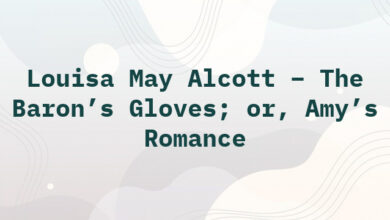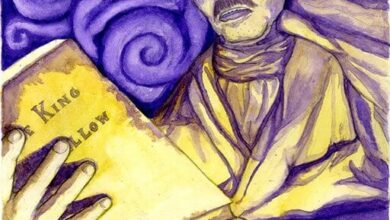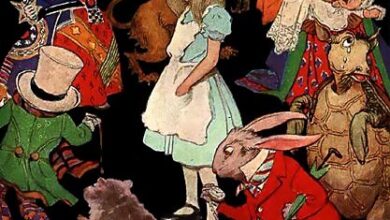
Kitty of the Roses by Ralph Henry Barbour
Chapter VII
“They are looking well after the rain,” he suggested interrogatively. She had shown no disposition to avoid him, in fact, her rather distant inclination of the head had preceded his own bow by a flattering fraction of a second.
“Yes,” she agreed, without, however, pausing in her task of filling her basket with great long-stemmed blooms. Burton left the table and leaned over the fence.
“On a day like yesterday one rather wishes oneself a rose-bush or tree or something equally inanimate, don’t you think?”
“I don’t think I ever have,” she answered. “Why should one?”
“Perhaps you are one of those unnaturally cheerful persons who like rainy days,” he said. “For my part, I can’t bear them. Yesterday, for instance, I was awfully bored. I think I must have stood at my window up there for all of an hour looking down here and wishing for the sight of”—he suddenly recollected his resolve to be on his good behavior—“of a human being. It was a beast of a day!”
“You didn’t look happy, that is true,” she said, bending to rescue a fallen clump of flaring red Luxembourgs.
“Then you saw me?” he asked eagerly.
“Why not? You stood in full sight at your window.”
“But—but I didn’t see you,” he answered aggrievedly. She shook her head.
“You couldn’t; I was in the kitchen making cake.”
“Really?” From his tone one would have thought the making of cake a wonderful and quite unprecedented performance.
“Really,” she mocked smilingly.
“What—what kind?” He sought desperately in his mind for knowledge on the subject. “Gingerbread?”
“Chocolate layer cake,” she answered.
“Oh!” he sighed ecstatically.
“Do you like it?” she asked, touched, perchance, by the pathos of his tone.
“Worship it!” he assured her. “I suppose you—er—I suppose you haven’t any left?”
“I think there is some,” she answered, striving to control the quivering corners of her delicious mouth. “Are you hungry?”
“Awfully,” he sighed. “Will you take pity on me?”
“I think you want a great deal. Yesterday it was roses, to-day cake. I wonder what it will be to-morrow?”
It was hard work keeping back the “You!” that rushed to his lips. But she had acknowledged the possibility of their meeting again on the morrow, nay, had practically suggested it as though it were a matter of course, and he took heart from that.
“I’ll say no more about the cake,” he said insinuatingly, “if you’ll give me the roses.”
“But I’m not sure I wouldn’t rather give you the cake,” she replied thoughtfully. “You see, the roses mean more to me.” Her eyes ranged slowly, lovingly over the garden. The shadow of her hat cast a warmer tone over one clear, creamy cheek, and Burton’s heart thumped immoderately.
“They would mean more, much more, to me, too,” he said softly, and his voice was not quite even. Perhaps she caught his meaning; at least the shadowed cheek found new color, and she made a little movement as though to go on her way up the path towards the house. But—and perhaps, after all, she was not altogether displeased—she only bent her warm face over a tempting spray of golden blossoms, and Burton, who had noted the impulse toward flight, went on hurriedly:
“One hears so much, and rightly, of Southern hospitality,” he said, “that certainly I am not mistaken in thinking you will give me, out of your vast wealth, one little rose a day?”
“You wouldn’t rather have the cake?” she asked, raising her head and viewing him quite calmly.
“No, the rose, if you please.”
“But it was delicious cake,” she went on musingly. “It was really the best I ever made, and Aunt Amanda says I make very good cake.”
“I could never doubt that,” he answered gallantly.
“It was very high, and it had four layers of lovely chocolate cream filling and lots and lots of chocolate icing on top. Don’t you like chocolate icing?”
“Awfully, but I like roses—some roses—far more.”
“Oh! But—every day? Don’t you think that’s rather often? Fresh roses will easily last three days without wilting, and if I gave you one this morning it ought to do until—let me see”—she counted the tips of three gloved fingers—“why, until Thursday!”
But he shook his head with decision.
“It must be one a day.”
“Must?” she repeated with a tinge of emphasis and a slight lifting of her brows.
“Pardon me, should was what I meant to say. I shall soon begin to think you a miser. Perhaps if I look out into the garden some moonlight night I shall see you here counting your roses, as a miser counts his gold.”
She smiled at the picture he drew. Then, tossing some loose petals from her hand with a gesture of surrender,—
“Very well,” she said, “you shall have your one rose a day while you’re here. I reckon it won’t impoverish me, for no one never stays in Belle Harbour very long at a time—unless one lives here.”
He thought there was just a suggestion of interrogation in the remark.
“Don’t be too sure of that,” he replied. “I came down here for a fortnight, but I shan’t promise to go at the end of that period. You see, in New York I am not presented each day with a rose.”
“You must be very fortunate to be able to make your business affairs secondary to your whims,” she said a little unkindly.
“I am very fortunate,” he answered simply.
“But to stay here in our poor little shabby town just for a handful of roses?” she persisted. “It sounds rather silly, doesn’t it?”
“Have I said,” he asked gently, a smile hovering under his moustache, “that it was altogether the roses? When you are tired of having me come a-begging to your garden fence send—send Aunt Amanda out with my rose.”
She laughed softly and caught up the skirt of her white gown in the hand that held the scissors.
“I will remember,” she said. “Good morning.”
“But my rose?” he cried in dismay.
“To-morrow,” she answered mockingly, “if Aunt Amanda is not too busy.”
She nodded and moved away towards the house.
Burton gazed ruefully after her until the door had hidden her from his sight. Then he went back to his chair under the Daphne-tree, clasped his hands behind his head, tilted back and sighed ecstatically.
Five minutes passed; ten; twenty. A lark high up in the magnolia-tree sang his shrill and florid melody to unheeding ears. The sun crept higher and higher until the shadow of the Daphne-tree reached the edge of the grass-plot. The bees rose and fell above the blossoms on invisible wings and humming-birds darted and poised along the tangle of honey-flowers.
Suddenly Burton’s chair came down with a thud and he sat erect, a frown on his brow.
“Were there,” he murmured, “or were there not dimples?”
“I think I must be repentant,” he said the next morning. “I’ve been feeling strangely happy of late—in fact, ever since I saw you coming out of the house.”
“Your repentance is not of very long standing,” she scoffed.
“Don’t discourage me, please! Five minutes of time may be of little consequence, but five minutes of happiness is so uncommon as to be priceless.”
“You are unfortunate,” she answered gravely. “I should be thankful, I suppose, that my happiness is not reckoned by minutes.”
“Unberufen!” he cried.
“Unberufen!” she echoed. Then their glances met and they laughed together. He saw with relief that the dimples were not mere creations of his imagination; they were there, appearing and disappearing on the clear, soft cheeks. He held a withered spray of roses across the fence.
“You are prepared to fulfil your promise?” he asked.
“Are you sure I promised?”
“Absolutely!”
“I said perhaps.”
“Impossible! Do you imagine that I would have got out of bed at six o’clock this morning, bolted my breakfast, and waited here under this absurd tree for nearly an hour and a half unless I had been certain of the reward?”
“Really? But you don’t look hungry.”
“I’m starved—for roses; absolutely famishing!”
“How awful!” she exclaimed in awe-struck tones. “Wait, then.”
She turned and looked about her over the laden branches.
“Does your hunger demand any especial kind or color of rose?”
“It does; it cries aloud for a large pink rose with one or two crushed petals.”
“What a strange appetite you have! I’m afraid I can’t see one just filling those requirements.” She creased her forehead and looked the garden over.
“May I help you?” he asked.
“I wish you would.”
“Then I will respectfully suggest that the rose you wear exactly fits the description. In fact, strange as it may seem, it appears to have been fashioned with that end in view.”
He met her glance with one of serene and self-satisfied composure. Her eyes dropped to the blossom in question and she lifted it and examined it carefully.
“It is strange,” she mused. “Here are the crushed petals and all.” He held out his hand. “But, then, there are larger roses and pinker ones, beyond doubt, and as for crushed petals—why, they are easily made.” She moved towards a bush of immense cabbage-roses and put forth her scissors.
“One moment!” he cried. She turned, mutely questioning.
“Appetites,” he went on plausibly, “are capricious things—mine especially. Having once set itself upon a certain thing it rejects all others, no matter how similar in outward appearance they may be. My hunger craves the rose you wear. I throw myself—and my hunger—upon your mercy! Be generous! You see before you a starving man!”
She turned back with a little gesture of despair and slowly, hesitatingly, detached the blossom from her gown.
“Of course I can’t refuse a starving man,” she said.
“It would be quite impossible,” he answered.
“And so”—she stretched the pink blossom out to him and he seized it greedily across the fence—“I shall take credit to myself for having saved your life,” she said soberly.
“Please do so every minute of the day,” he begged. “And now——” He held forth the withered spray he had received the day before. But she shook her head.
“I have so many fresh ones, you see.”
“But it was a part of the bargain!” he pleaded.
“Was it?” She accepted the limp cluster of faded blooms, viewed it carelessly, and dropped it to the path, where it lay, a pathetic symbol of Beauty’s perishableness.
“Kitty,” he said to himself, “you’re a minx, a dear, charming little minx!”
“Please tell me,” he said aloud, “what you do with yourself all the rest of the time?”
She looked across questioningly.
“After you leave the garden, I mean. I see you for a minute or two and then you utterly disappear and never come back—until the next morning. Do you live in a real house? Is there a front door to it? Or is it an enchanted palace? If I searched, could I find it, or would folks merely look at me compassionately and shake their heads if I asked them to direct me to the Castle of the Roses?”
“Oh, I’m sure they’d shake their heads,” she laughed, “if you asked for that. But there is a front door.”
“And if I were to come to it and ask—ask for the Princess——”
“Aunt Amanda would send you away in short order. You see, she doesn’t consider me exactly as a princess.”
“Then whom would you advise me to ask for?”
“Nobody.”
“Oh! But—if I should get someone to bring me?”
“That might be different, I reckon. Perhaps then Aunt Amanda would let you in.”
“And the Ogre? I would not be eaten alive?”
“The Ogre?” she asked, puzzled.
“Yes; I heard him calling you one morning.”
“Oh,” she laughed, “the Ogre! Well, now as for the Ogre—— But you’d have to risk the Ogre.”
“I will!” he exclaimed with decision. “Only—— Perhaps you know a Colonel Barrett here in Belle Harbour?”
“Barrett?” She shot a sudden glance of surprise. “What is his first name?”
“I—really, I don’t remember. A friend in Baltimore insisted upon giving me a letter of introduction to him. I don’t fancy them much, you see, and so I’ve never presented it. But now—if you think—that is, you know, if Colonel Barrett knows the Ogre—or Aunt Amanda—” He paused suggestively.
“There is a Colonel Robert Barrett here,” she said, “and I’ve met him. And I think”—she was smiling as though the mention of the Colonel’s name evoked humorous recollections—“I think he knows the Ogre.”
“Really?” he cried. “Then I must find him out. When you come to think of it now, a letter of introduction is something that shouldn’t be neglected, should it?”
“I never had one,” she replied demurely. Then, catching sight of the neglected basket of roses, “Oh, just see,” she exclaimed remorsefully, “they’re all withering!”
“Not enough to hurt,” he said. “Besides, there are lots more.”
But she shook her head and, with the basket over one arm and scissors and skirts in hand, turned towards the house.
“Good-morning,” she said.
“Oh, but wait.”
“Well?”
He searched desperately for something to say, anything to keep her there. Finally,—
“They’re looking well, aren’t they, the roses?”
“Oh, yes.”
“But—er—perhaps they need rain? Roses require a good bit of moisture, don’t they? I think I’ve read somewhere that—er—that——”
“Good-morning.” She turned away again, smiling deliciously when her back was towards him, and went quickly up the path.
“Good-morning,” he called regretfully. Then:
“Confound it, I did read something about roses and moisture somewhere! Now, what was it? Just like my silly memory to go back on me when most needed! I shall read up on roses; everyone ought to know about flowers.”
He gathered up his papers and writing utensils and went up to his room. There he placed the pink rose in a goblet of water and, in the manner of one performing a sacred rite, pressed his lips to the crushed petals.
“This afternoon,” he said, “I will present my letter to the worthy Colonel.”
But he didn’t, for with the afternoon came a telegram from New York calling him back. For a few moments he railed eloquently at fate: in the end he accepted her command with ill grace: “I am leaving my trunk, Mrs. Phillips,” he explained to his landlady, “in order that I may return and get it later. Meanwhile I shall be glad to retain the rooms. I shall be back in a week or ten days, I fancy.”
During the operation of packing a suit-case he made trips to the window overlooking the rose-garden at frequent intervals, but without reward. The back of the Castle presented a sleepy, undisturbed aspect, and the garden was empty of all life save birds and bees and butterflies. Just before it was time to leave for his train he went down to the iron fence and looked mournfully across.
“Kitty,” he whispered to the drowsing leaves and blossoms, “Kitty of the Roses, I’m coming back to you, dear, just as soon as the Lord will let me.”
Suddenly he remembered the withered spray of roses that she had dropped to the path, and a desire to repossess it took hold of him. His cane was in his hand and he knew just where they had fallen. He leaned over the tops of the pickets and reached forward. Then he stopped.
The roses were gone.
Chapter VIII
Burton returned to Belle Harbour and King’s Street just two weeks later to a day. It was dusk when he stepped on the station platform, and starlit darkness when, followed by a tattered and grinning little darky bearing his luggage, he reached his lodgings. His first act was to throw open the bowed shutters and look out upon the Enchanted Garden. It was a dark expanse of bush and hedge, with here and there an uncertain fleck of gray where the wan light from the sky caught a white blossom. Beyond, the house was empty of light. Something—what he scarcely knew—in the aspect of house and garden oppressed him; had he believed in premonitions he would have accepted that as one of ill augury. He turned away with a shrug of impatience and lighted his lamp.
In the morning he leaped out of bed and again thrust aside the blinds. His heart sank. The Enchanted Garden was still below him; but it looked unmistakably neglected and uninhabited. Most of the roses were through blooming for the while and what blossoms there were seemed faded and imperfect. The blinds in the rear of the Castle were all tightly closed; the hammock was gone from the porch; the vines looked dusty. In a sudden panic of alarm Burton strode to the hall and called loudly for Bob.
“Have those people in that house over there gone away?” he demanded when the darky appeared.
“Which house is dat, sah?”
“There, idiot—beyond the rose-garden! Have they gone?”
“Oh, yessah; they gone; been gone a week, I reckon.”
Burton sat down on the edge of the bed and groaned. Then,—
“Where?” he demanded. Bob shook his head:
“I dunno, sah; somewhars up No’th. The Colonel he al’ays goes No’th in summer.”
“The Colonel?”
“Yessah, Colonel Barrett. Wasn’t you askin’ about——”
“Barrett!” Burton seized Bob by the arm and dragged him to the casement. “Look here,” he said desperately, “do you mean to tell me that Colonel Barrett lives in that house, the one with the rose-garden behind it?”
“Y-yessah, I surely does, sah.”
“You’re not mistaken?”
“No, sah; why, I knows the Colonel well!”
“Then why didn’t you tell me this before, you fool nigger? Why didn’t you tell me Colonel Barrett lived there?”
“Yo’ didn’t ask me!”
“Oh, get out of here!” groaned Burton. “Hold on, though. Has the Colonel a daughter?”
“No, sah, he ain’ never got mahied.”
“Then——” cried Burton in sudden hope.
“He got a niece, though.”
“Oh! So she’s his niece? What’s her name?”
“Name’s Miss Kitty.”
“I know that,” said the other impatiently. “What’s the rest of it?”
“Ah ain’ never heard no mo’.”
“Do you mean to tell me that she has no last name?”
“Oh, las’ name! I didn’t know you meant las’ name, sah. Las’ name’s Fletcher, o’ co’se!”
“That’s all. Get out!”
Bob departed to tell the cook that] “Mister Burton he done wen’ crazy,” and the subject of the announcement remained for many minutes sitting on the bed in his pajamas gazing out into the Enchanted Garden and mentally heaping maledictions upon himself. The thought of the letter of introduction in his trunk was maddening. It was all very plain now; no wonder she had smiled when he had asked about the Colonel!
“Oh Kitty, Kitty!” he muttered, “you’re the cruel one!”
After breakfast he packed his trunk hurriedly and then, armed with the letter, sallied forth. Down King’s Street he went to the first corner; here a half-obliterated sign, nailed against the trunk of a giant oak, bore the legend “Mary Street;” he counted the houses and chose the third one. Emptiness was written all over its sleepy, red-brick front. Nevertheless he knocked, and waited. After many minutes the door was opened cautiously and an aged negress—he was certain it was Aunt Amanda—stuck her head through the narrow aperture.
“Is Colonel Barrett at home?” asked Burton.
“No, sah, he gone up No’th.”
“Impossible!” exclaimed Burton, simulating intense surprise and dismay. “I have a letter of introduction to him. Can you tell me where he has gone?”
“New Yo’k.”
“And the address there?”
“Can’ tell yo’ that, sah; reckon, though, jes’ ‘New Yo’k’ will fin’ him.”
“But isn’t there anyone here in town that can give me his address?”
“Don’ reckon so.”
“But his mail, where does that go?”
“Folkses at the pos’-office lookin’ arter that, sah.”
“Oh! And is Miss Fletcher with him?”
“Yessah.”
“Thank you. I think I will leave my card. Will you kindly see that he gets it when he returns?”
Burton tried the post-office without, however, much hope of success. And, as he had expected, the post-mistress, an elderly lady with an extremely suspicious expression about her thin lips, refused to divulge any information.
“It’s a rule of the Department,” she explained severely.
That evening Burton returned to New York without having obtained any more explicit directions than those given by Aunt Amanda. But he was not hopeless. Surely, he assured himself, it would not be difficult to discover the whereabouts of the Colonel and his niece so long as hotel registers were open to public inspection.
But at the end of two days he had changed his mind. At the end of the third he gave up the search. New York had swallowed the Princess and the Ogre! Burton returned to his affairs, which had begun to suffer, and strove, for their good, to banish thoughts of Belle Harbour and the Enchanted Garden and Kitty of the Roses from his mind. But the task he had set himself was a difficult one; and just when it seemed that he was arriving at some degree of success, lo! a prankish Fate interposed.
It was well into July. New York had been sweltering all day under hot, cloudless skies, and even the darkness brought no relief. To stay indoors was out of the question, and so Burton dragged himself from an already deserted club after a late dinner and hailed a hansom.
“Drive around,” he directed,—“any old place so long as it’s cool.”
Cabby turned the horse’s head up-town and it trotted listlessly along over the still heated asphalt. Burton leaned forward to catch what air there was and smoked and meditated. For some reason—perhaps it was a glimpse of a florist’s window that did it—his thoughts flew southward to a garden of roses and to a small, graceful figure that walked therein. Fagged by the heat of the long day, he had no strength left with which to combat temptation, and he yielded. It came back to him very vividly; closing his eyes he saw the garden and the blank, drowsy old house; he saw the door beside the rose-vines open and a white-gowned figure trip down the steps. She came nearer and nearer, smiling, happy-eyed, the broad brim of her hat lifting in the breeze and chasing the edge of the mellow shadow over her cheek. Never before had her face come back to him so clearly. In the length of eight blocks he lived over those precious mornings minute by minute. In the middle of the ninth he was suffering all the torments of a despairing lover of twenty. He hurled the dead cigar from his lips to the pavement and thrust up the trap with his cane.
“This won’t do,” he muttered savagely; and aloud, “Stop here; I’ve had enough.”
On the curb he found himself bathed in the bright glare of many lights; he had landed at the entrance of an uptown theatre. With a shrug of his shoulders he went in. “As well here as anywhere,” he thought. Of the entertainment he recalled but little the next day. But the theatre was fairly cool and the music bright and eminently cheerful. When the final curtain had descended he joined the pushing throng at the right of the house. Half-way towards the entrance his eyes, ranging carelessly over the scene, were suddenly arrested and his heart leaped. Across the rows of empty seats, at the far side of the theatre, a man and a girl were slowly making their way towards the door. The man was tall, thin, with grizzled hair and moustache, Southern-looking from head to heel, and about fifty years of age. The girl was slight and rather small, with brown hair and warm skin hued like the inner petals of a rose. She was plainly dressed in a street skirt of gray and a white shirt-waist against which three or four pink roses drooped. In short, it was Kitty—and the Ogre!
Burton looked about him desperately. The only course open was to remain in the aisle where he was and trust to reaching the lobby in time to intercept them. He took advantage of every cranny and crevice in the throng and pushed his way through with slight regard for toes or skirts. It seemed hours before he reached the entrance. Now and then he was able to catch sight of his quarry over the shoulders of the throng. It was while so engaged that he heard an eloquent sound of rending silk and felt himself seized roughly by the arm. He turned to face an indignant cavalier.
“Sir, you are very awkward! You should look where you are going! You have torn this lady’s dress!”
“I am very sorry,” replied Burton, striving to wrest himself from the other’s clutch. “Believe me, Madam, I am deeply grieved and—er—— I beg of you, sir, don’t detain me; I am trying to reach some friends who——”
“Deuce take your friends, sir! Your clumsiness——”
But Burton wrenched himself free and plunged into the lobby, followed by muttered execrations from those whom he unceremoniously thrust from his path. But the delay had cost him dear. The Princess and the Ogre were not to be seen. He rushed to the street door just in time to catch a fleeting glimpse of a gray skirt disappearing into a brougham.
“Kitty!” he called, and struggled across the sidewalk.
The door closed, the driver snapped his lash, and the carriage rolled away. And yet for an instant he was certain a face had looked from the window and a hand had rested upon the sill. He hailed a hansom.
“Keep that brougham in sight,” he said hurriedly. “There’s a five-dollar bill in it if you do!” With one foot on the step he paused, stooped, and lifted something from the asphalt.
lifted something from the asphalt It was a pink rose.
The driver’s task was not a hard one. The brougham went northward slowly for a few blocks and then turned to the west down a quiet side street. Presently Burton’s conveyance stopped.
“All right, sir,” said the driver.
The brougham had paused some dozen doors beyond and its passengers were alighting. Burton descended, dismissed his cab, and keeping the house into which the Princess and the Ogre had disappeared in sight, walked leisurely towards it. It proved to be a small, unpretentious, but attractive hotel. When he entered the hall was empty save for a clerk, behind the tiny desk, and a negro elevator boy.
“Is Colonel Barrett, of Virginia, staying here?” Burton asked.
“Yes, sir. Will you send up your card?”
Burton hesitated; then shook his head.
“No, I think I’ll wait until morning; I presume they have retired?”
“Did Colonel Barrett and the young lady go to their room, Billy?” the clerk inquired. The elevator boy nodded sleepily. Burton turned away and walked homeward through the breathless streets with a triumphant joy and a fragrant pink rose for companions. To-morrow he would see Kitty, his Kitty, Kitty of the Roses!
Burton purchases roses He went to his office early the following morning, and at ten o’clock, summoning a hansom, had himself driven to a florist’s. There he purchased two dozen and one roses and personally superintended the packing and dispatching of them. His selection may have struck the attendant as somewhat unique, consisting, as it did, of a dozen white blossoms, a dozen pink ones, and a single half-blown bud of deep crimson; but Burton, remembering Kitty’s wont, thought she would understand. After the flowers had been sent he hesitated a moment on the curb. In the end he sent the cab away. He did not want to present himself at the hotel before eleven; the thought of sitting inactive in a club window was distasteful; he would walk slowly uptown. So he crossed to the Avenue and, lighting a fresh cigarette, idled from window to window in a desperate attempt to kill time. He allowed no display on the shady side of the street to pass unexamined, and by the time he had reached his northerly goal his brain was a kaleidoscope of sporting prints, French landscapes, jewelry, silk stockings, bric-à-brac, lingerie, and smokers’ articles. But it was eleven o’clock!
This time there was no premonition of disappointment. He sought the desk and produced his card.
“Sorry, but Colonel Barrett and his niece left ten minutes ago for the steamer,” said the clerk.
“Steamer!” gasped Burton. “What steamer?”
“I’ll find out for you in a minute from the porter.” He disappeared, leaving Burton leaning against the desk staring blankly out onto the sun-smitten pavement. In a moment he returned.
“Trunks went to the American Line pier, sir.”
“Thank you,” Burton muttered. Then, turning suddenly at the doorway, “What time is the sailing?”
“Half after twelve, sir, I believe.”
Burton glanced at his watch, compared it with the smug-faced clock over the desk, and strode to the steps. But again he turned:
“I sent a box of flowers here for the young lady this morning; did she get them?”
“No, sir, they came just after she’d left. They’re here; I was going to send them back to the florist’s.”
That was a wild race against time! With the long box of roses between his knees, one hand on his watch, and a cigarette hanging unlighted from his lips, Burton sat like a stern-faced Fate and was whirled from the hotel to the wharf in what was practically one long bump. When the horse was pulled back on his haunches before the pier entrance there was no need to ask questions: a stream of persons whose handkerchiefs still hung from their hands was emerging into the hot sunlight.
With a groan Burton threw himself back against the cushions.
“Never before in the history of ocean travel has a steamship left on time,” he muttered.
“But to-day—oh, damn!”
“Where to, sir?” asked the driver, his red, perspiring face glowing above the opened trap. Burton gulped, and then gave his office address. The wearied horse and creaking hansom crept dejectedly uptown again through close, furnace-like streets and over pavements that threw the heat upward with intolerable intensity. Burton thought of the open, wind-swept ocean and cursed weakly. When the hansom came to a stop in front of the narrow, white-marble monstrosity on the tenth floor of which was his office, he paid three prices to the driver and strode towards the entrance. The cabman called after him,—
“Hi, sir, you’ve forgotten your flowers!”
Burton turned and scowled ferociously.
“I don’t want them,” he said. “Throw them away—take them home—eat them—anything!”
But cabby, being a person of business principles, did none of these things: he sold them at the next corner to a sidewalk vender for fifty cents.




